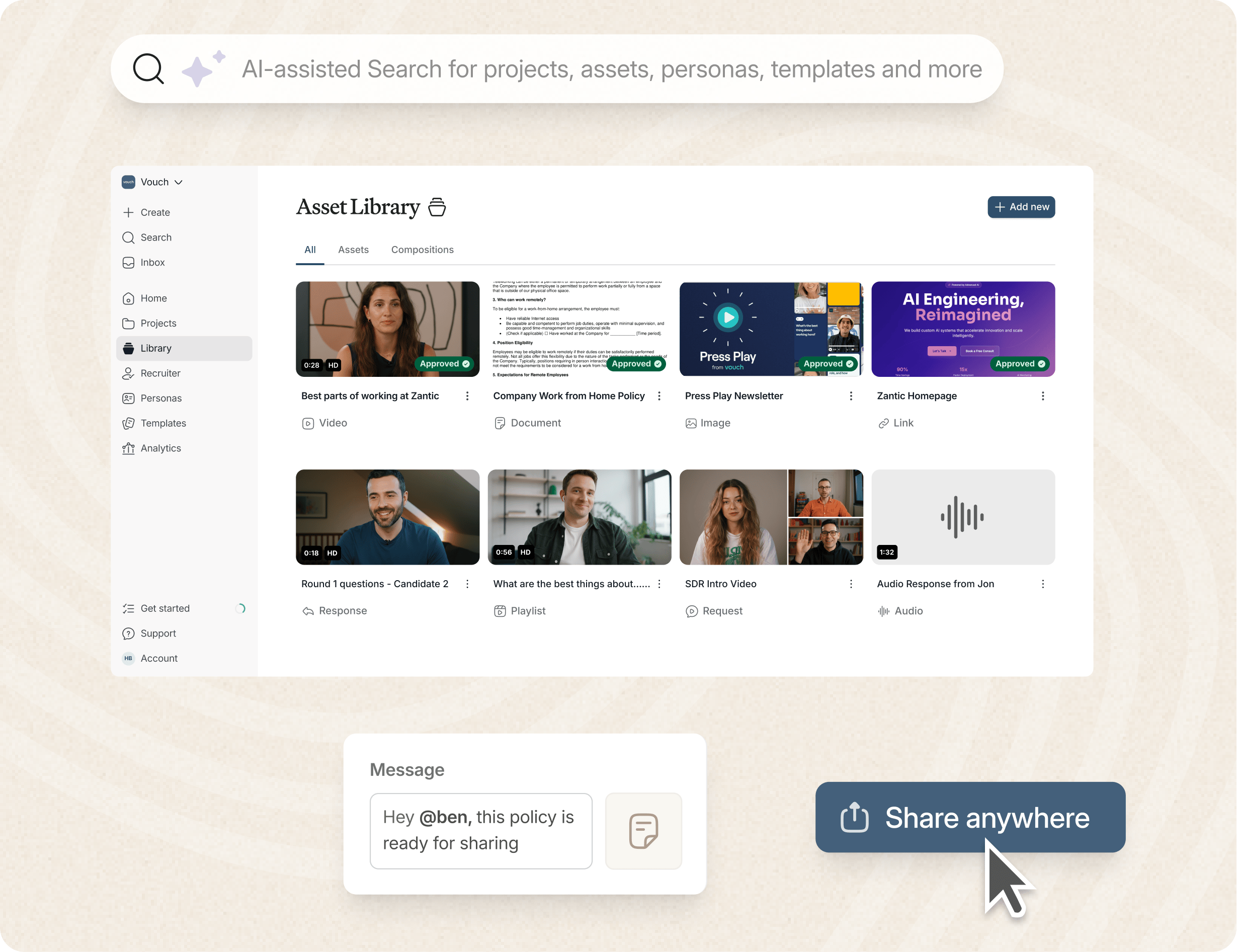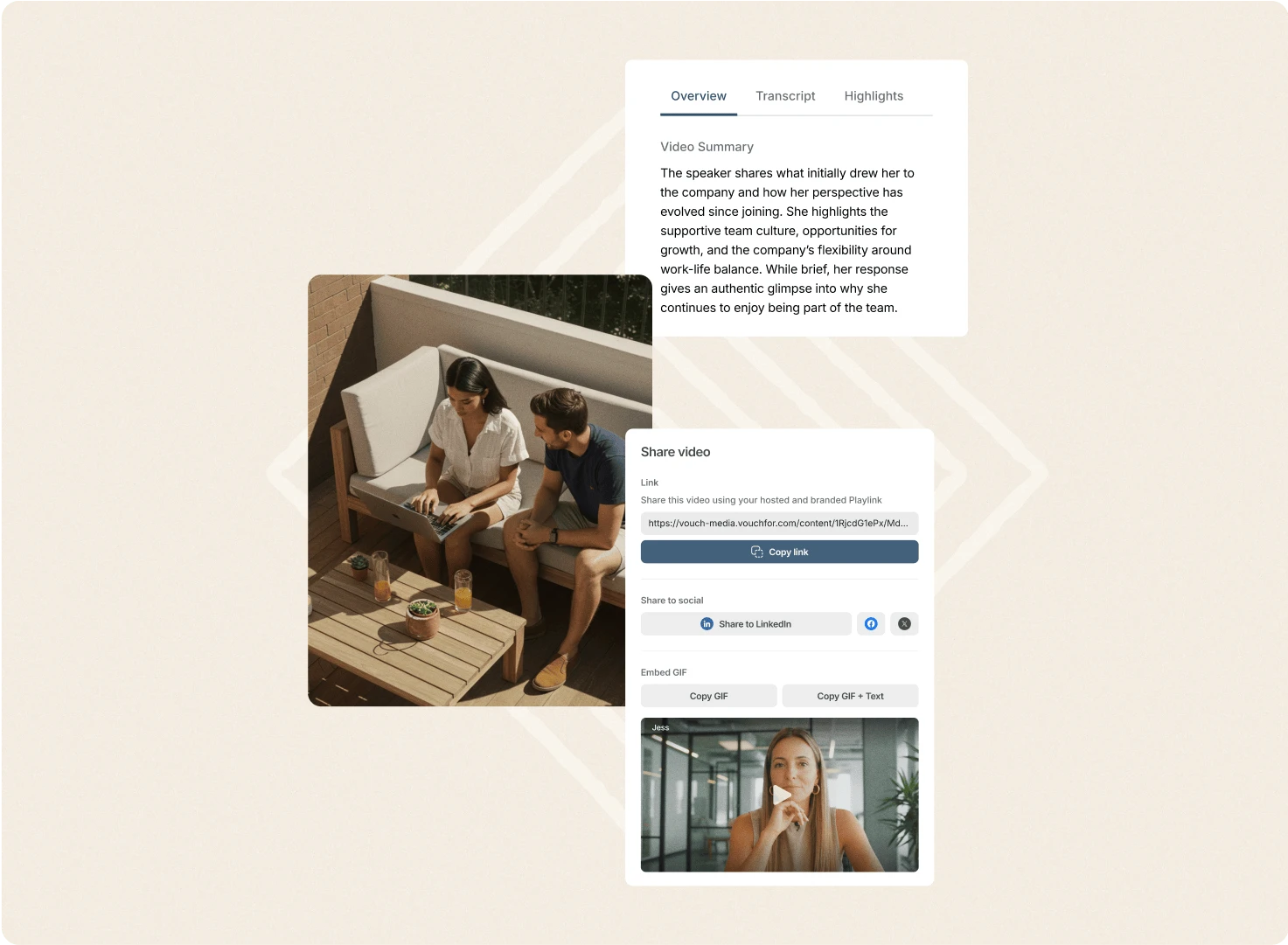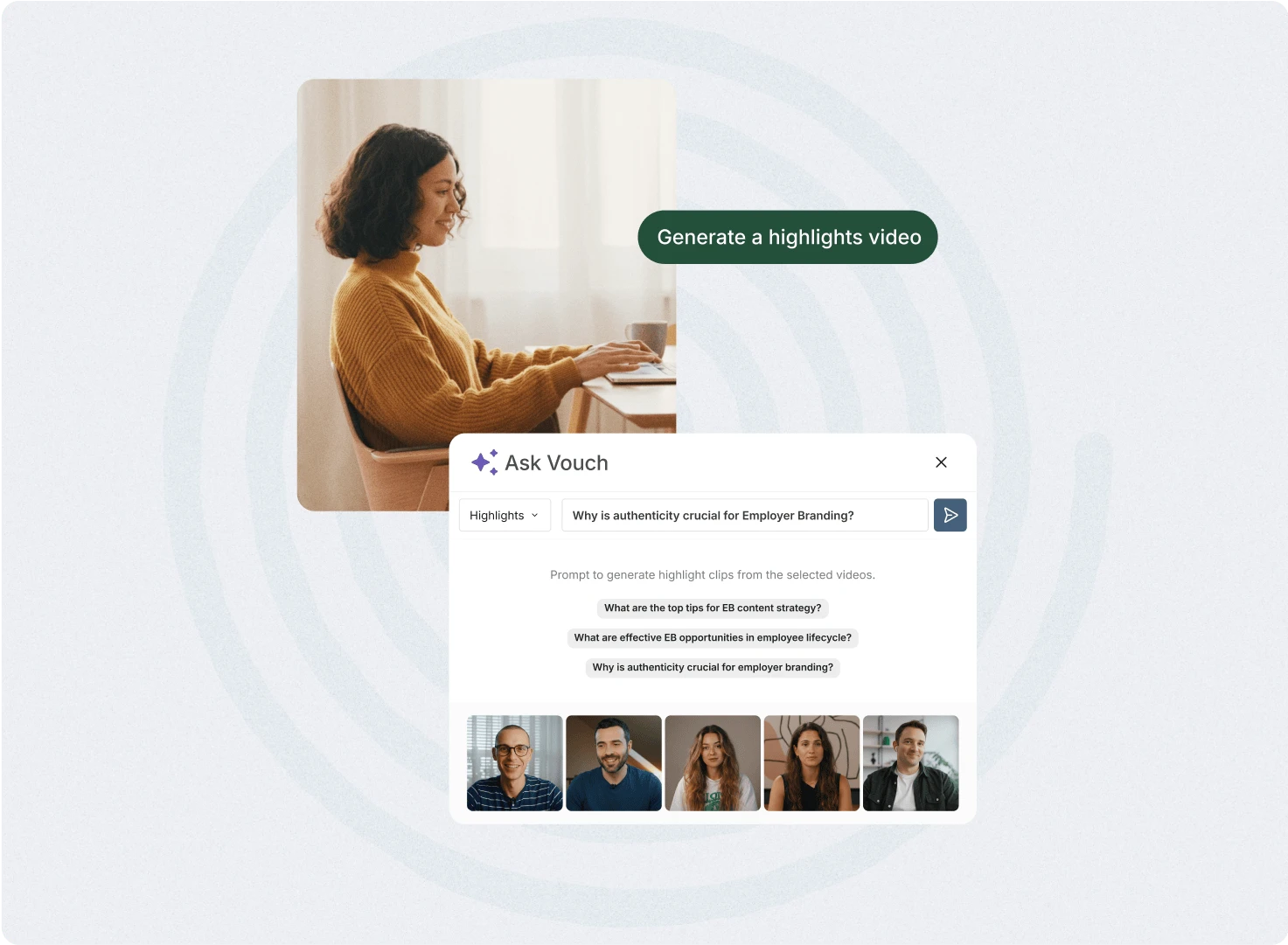We're in the middle of a revolution - and it's not just in gaming.
The Virtual Reality (VR) and Augmented Reality (AR) industries are exploding, with the global VR market expected to reach $87 billion by 2030 (Statista).
As demand soars, so does the need for top talent like engineers, designers, developers, and content creators.
But here's "the catch": the best candidates are now picking companies based on their workplace culture, flexibility, and innovation, not just compensation.
That's why your employer branding matters more now in 2026 than ever.
So let's explore 7 data-backed, actionable steps VR & AR companies can use to become a true employer of choice.
Step 1: Use Vouch To Bring Your Team To Life
People want to see the real team they are going to work with, and video does that better than any other medium.
Vouch is a powerful video tool that lets your team share authentic employee stories, team bonding moments, and onboarding journeys.
For Virtual Reality companies, video is ideal for:
- Creating VR Office Tours or 360-degree videos of your workspace
- Capturing employee testimonials about remote collaboration and innovation
- Showcasing company events, training programs, or AR coding challenges
Statistics: According to employer branding statistics, 75% of candidates say employer brand influences their decision to apply.
Step 2: Build A Careers Page For Digital Natives
Your careers site should look like your product: interactive, immersive, and futuristic.
For example, add an interactive job preview or even a VR simulation of a typical project..
Must-haves for VR company career pages include:
- Clear Employee Value Propositions (EVPs)
- Info on remote work, flexible hours, and onboarding processes
- Embedded employee stories and day-in-the-life snapshots
- Strong links to diversity and inclusion initiatives
The AI-enabled workspace for talent teams.
- Unified workspace for talent teams
- Accelerate hiring with AI tools
- Auto-generate polished hiring and employer brand content
- Easily repurpose assets across all channel

Step 3: Bring Your Recruitment To The Metaverse
It's time to ditch the Zoom interview and step into Recruitment 2.0.
According to a report by Ivy Exec, virtual internships and virtual intern programs are increasing candidate engagement and reducing dropout rates during onboarding.
These platforms also enable a more inclusive, bias-reduced experience, ideal for reaching millennial and Gen Z workers who expect tech-driven engagement.
Innovative VR companies are already hosting:
- Virtual career fairs inside platforms like Somnium Space or The Sandbox
- VR chats and team-based challenges as part of the hiring process
- Realistic VR coding environments for skill assessments
Step 4: Make Onboarding An Experience, Not A Process
If you're a virtual company, you need a virtual onboarding program that goes beyond a PDF welcome packet. A study from IMR Press - Volume 36, Issue 1 found that immersive training programs increased retention rates by over 30% compared to traditional slideshows.
Make the first week count because a great onboarding sets the tone for long-term employee satisfaction and retention.
Onboarding tools to explore:
- VR onboarding walkthroughs of office spaces or training centers
- Gamified tutorials using MIMBUS DISCOVER or VULCAN Platform
- Real-time 360-degree livestream intros to the team
- Onboarding challenges that build knowledge retention through interaction
- Video training and communications tools like Vouch.
Step 5: Amplify Culture Through Social Media and VR Events
Top candidates aren't waiting for your job ad; they're watching how you show up online, and this is where you need to be real, such as highlighting challenges, sharing wins, etc. Let your people speak authentically.
That's how you build an emotional connection and brand perception that resonates.
To increase brand visibility and build trust:
- Share behind-the-scenes videos of VR Company Events or VR Chats
- Use LinkedIn Live or Instagram Reels to show remote team rituals or collaboration wins
- Get employees involved in takeovers on social media platforms
Statistic: According to Glassdoor, companies with a strong social employer brand can reduce cost-per-hire by up to 50%.
Step 6: Treat Your Candidates Like Your Customers
The candidate experience is your employer brand's front line, so consider using tools like Candidate NPS to track how candidates rate your hiring process, then improve from there.
Don't ghost. Don't stall. Respect your candidate's time, and they'll respect your brand.
Start with implementing:
- Personalized videos after job applications
- Clear communication during every recruitment process stage
- Transparent timelines and feedback after interviews
- Engaging digital job previews or mini VR projects as trial tasks
Statistics: ResearchGate GmbH published findings showing that strong candidate engagement increases offer acceptance by 40% in high-tech industries.
Step 7: Invest In Continuous VR & AR Training
Learning isn't just for new hires - it's also the key to retention.
Training enhances employee experience and collaboration in remote teams.
The result? Higher engagement, faster upskilling, and a stronger internal talent pipeline.
For ongoing trainging, try implementing:
- VR-based employee training in design, coding, or content creation
- Simulated team-based exercises for project management skills
- Partnering with platforms like Sud Conseil Formation for industry-specific training
- Building internal training centers using VR simulations
Statistic: According to Dan Griffiths, VP of High-Tech Platforms at PwC, companies using VR in training saw retention rates increase by 76%.
Who Are The Top 10 VR Companies Globally?
When looking at the 10 largest Virtual Reality companies worldwide, we can see that these companies are shaping the future of immersive tech through innovation in VR hardware, software, and content.
1. Meta (Facebook Reality Labs)
Revenue: Approx. $1.9 billion
Meta is the parent company of Oculus Quest 2 and a leading force in the metaverse space. Their VR division, Reality Labs, is pushing immersive experiences at a global scale.
🔗 https://about.facebook.com/realitylabs
2. HTC VIVE
Revenue: Approx. $620 million
HTC's VIVE division is a key player in high-end VR hardware and enterprise solutions. They're heavily involved in both consumer and business VR environments.
3. Sony Interactive Entertainment (PlayStation VR)
Revenue: Approx. $27.1 billion
Sony's VR offerings sit under its gaming division, and the PlayStation VR2 platform is a staple in console-based VR.
4. Unity Technologies
Revenue: $2.2 billion
Unity is a real-time 3D platform used to create VR/AR content and simulations across industries, from gaming to enterprise.
5. Valve Corporation
Revenue: Estimated $13 billion (based on Steam's market and internal operations)
Valve is the maker of Valve Index and the SteamVR platform, key technologies in the VR ecosystem.
🔗 https://www.valvesoftware.com
6. Microsoft (HoloLens / Mixed Reality)
Revenue: $236 billion
Microsoft leads in enterprise AR and MR through HoloLens, focusing on education, healthcare, and industrial applications.
🔗 https://www.microsoft.com/en-us/hololens
7. Google (AR/VR Division)
Revenue: $307 billion
Google's contributions to the VR industry include Google Cardboard, Daydream (now sunset), and AR integration via Android.
8. Magic Leap
Revenue: Estimated $100 million
Magic Leap focuses on spatial computing and enterprise-grade AR solutions for medical, military, and manufacturing sectors.
9. Pico Interactive (A ByteDance Company)
Revenue: Estimated $500 million
Pico, acquired by TikTok's parent company ByteDance, is rising fast in both the consumer and business VR segments.
10. Somnium Space
Revenue: Estimated <$10 million (Web3/metaverse startup revenue based on NFT and land sales)
Somnium is a decentralized VR platform using blockchain technologies, NFTs, and immersive user-generated content.
🔗 https://www.somniumspace.com
What Are VR Talent Experts Saying About Hiring?
"Virtual reality interviews provide a unique and immersive experience for both candidates and employers, offering numerous benefits that can revolutionize the hiring process." – idibu, "The Rise of VR in Recruitment: A Paradigm Shift in Hiring"
"Virtual reality can help companies win talent by standing out … VR is a strong tool to promote an employer's brand." – PeopleScout (Margie Callard), "Virtual Reality: Enhancing the Candidate Experience"
"The three key ways into VR in recruitment are: Communication/collaboration; Training/work simulations; Talent attraction/employer branding." – Process.st, "Virtual Reality Recruitment: The Ultimate Hiring Solution or Just A Trend?"
FAQs
What is employer branding in VR companies?
Your employer branding is how your VR company is perceived by potential and current employees.
Why is employer branding vital in 2026 and beyond?
A strong employer brand helps your VR or AR company attract, engage, and retain top talent.
What tools help with VR employer branding?
Vouch is a great starting place for creating content that works, and you'll also need social media platforms, onboarding VR simulations, and Glassdoor, where you can monitor your employee reviews.
How can I create a virtual onboarding program?
Use VR platforms for tours, training, and team introductions during the pre-boarding and onboarding phases.
Are virtual career fairs effective?
Yes, absolutely. They increase reach, reduce costs, and boost candidate engagement for those who are in or who want to be in the industry.
What platforms host VR company events?
BE sure to check out Somnium Space, The Sandbox, and proprietary VR apps.
How do I measure employer branding success?
To track your employer brand, try tracking Candidate NPS, Glassdoor reviews, and your retention rates.
See Why VR Employer Brand Managers Love Vouch!
Loved by companies like Canva, Nike, Cisco, HubSpot, Amazon, and more, tools like Vouch make leveraging employer branding strategies in your business remarkably easy.
Book a Vouch demo today and chat with an employer branding expert about your business needs.
You might also like

Elevate Your Brand Today With Vouch
Discover how Vouch can accelerate talent acquisition while helping you stay on-brand.






